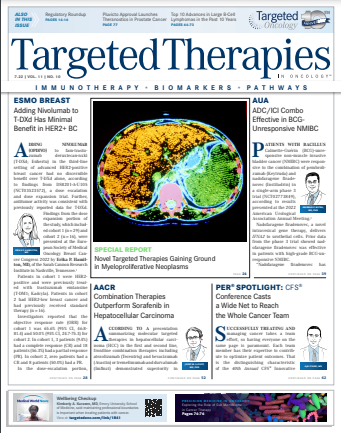ALCHEMIST Findings Suggest Need to Optimize Proven Therapies in Early-Stage NSCLC
Findings from the ALCHEMIST trial indicate 53% of patients received adequate lymph node dissection and only 57% received adjuvant chemotherapy, despite indications for this treatment.

A retrospective analysis of the ALCHEMIST trial (NCT02194738) revealed that a substantial proportion of patients with resected non–small cell lung cancer (NSCLC) who consented to adjuvant therapy screening did not receive adequate lymph node dissection or adjuvant chemotherapy.1 Findings indicate 53% of patients received adequate lymph node dissection and only 57% received adjuvant chemotherapy, despite indications for this treatment.
These results emphasize the need to optimize the use of proven therapies in early-stage NSCLC. Investigators noted that adequate lymph node staging has been associated with improved outcomes, and the use of adjuvant chemotherapy (specifically cisplatin-based) has led to improved survival by approximately 5% at 5 years.2
In the trial, 5 process outcomes were analyzed: if a patient had an anatomical resection, received adequate lymph node dissection, received any adjuvant chemotherapy, received any cisplatin-based adjuvant chemotherapy, and received at least 4 cycles of adjuvant chemotherapy. In addition to rates of lymph node resection and receiving adjuvant chemotherapy, investigators reported that 95% (n = 2697) of patients had resection, 44% (n = 1237) received at least 4 cycles of platinum-based adjuvant chemotherapy, and 34% (n = 965) received any cisplatin-based adjuvant chemotherapy.
When investigators evaluated outcomes, there was a statistically significant difference in the receipt of adjuvant chemotherapy by age (relative risk [RR], 0.54; 95% CI, 0.42-0.70 for patients aged ≥ 80 years vs those 60-69 years; P < .00024). Patients with stage II or IIIA disease were significantly more likely to receive adjuvant chemotherapy than those with stage IB disease (stage II disease: RR, 1.49; 95% CI, 1.30-1.71; stage IIIA disease: RR, 1.67; 95% CI, 1.46-1.91; P < .00024).
The care patterns of a cohort of 2833 patients with stage IB to IIIA NSCLC were evaluated for overall, sociodemographic, and clinical factors, including age, sex, race and ethnicity, and comorbidities.
Baseline characteristics indicated patients were a median age of 67 years (n = 2833; range, 21-92), the majority were men (53%), with 71% former smokers, 10% current smokers, and 16% never smokers. The majority (86%) had nonsquamous NSCLC and 15% had squamous NSCLC. Regarding mutational status, 9% of patients had tumors harboring EGFR mutations and 2% had ALK rearrangements.
Historically, the underuse of lymph node dissection has been reported in observational cohorts, but the investigators noted that it is particularly concerning in this pool of patients who were screened for adjuvant therapy trials.3 They also noted that the rate of chemotherapy was similar to other cohorts that were reported, but that the number of cycles of chemotherapy administered in this cohort was similar to patients in randomized clinical trials that supported the use of adjuvant chemotherapy.
The apparent low rate of adjuvant chemotherapy was not solely due to treatment patterns among patients with earlier-stage disease (eg, stage IB per American Joint Committee on Cancer, 7th edition) who may derive less benefit from chemotherapy. Only 65% of patients with stage IIIA disease in the cohort received adjuvant chemotherapy.
An association between the disparities in the delivery of care and sociodemographic factors was not apparent in this analysis, according to the investigators. They attributed the finding to selection bias from the enrollment of patients into the screening trial from which this cohort was derived. Further, there was no significant association between race and ethnicity with any of the outcomes.
REFERENCES:
1. Kehl KL, Zahrieh D, Yang P, et al. Rates of guideline-concordant surgery and adjuvant chemotherapy among patients with early-stage lung cancer in the US ALCHEMIST study (Alliance A151216). JAMA Oncol. 2022;8(5):717-728. doi:10.1001/jamaoncol.2022.0039
2. Pignon JP, Tribodet H, Scagliotti GV, et al; LACE Collaborative Group. Lung adjuvant cisplatin evaluation: a pooled analysis by the LACE Collaborative Group. J Clin Oncol. 2008;26(21):3552-3559. doi:10.1200/JCO.2007.13.9030
3. Osarogiagbon RU, Lee YS, Faris NR, Ray MA, Ojeabulu PO, Smeltzer MP. Invasive mediastinal staging for resected non-small cell lung cancer in a population-based cohort. J Thorac Cardiovasc Surg. 2019;158(4):1220-1229.e2. doi:10.1016/j.jtcvs.2019.04.068
